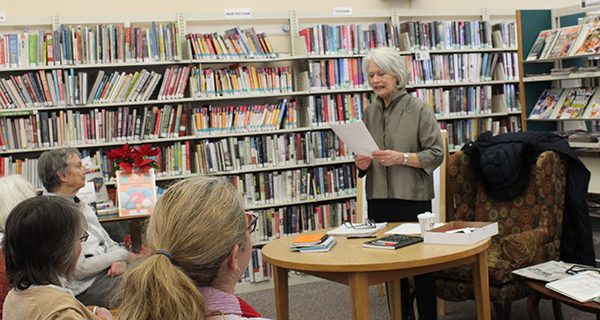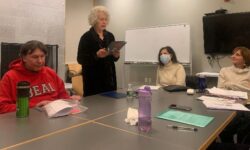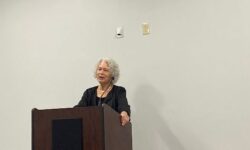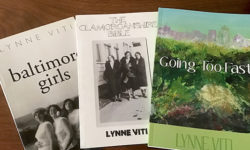By Laura Drinan
Hometown Weekly Reporter
She stood beside one of the large circular tables inside the Islington Branch Library. Behind thick, black-rimmed glasses, her eyes scanned the paper she held before her, occasionally looking up from the page to make eye contact with the audience. As she read the words on the page out loud, the audience submerged themselves into Lynne Viti’s world of poetry.
Viti visited the library on January 30 to read excerpts from her upcoming book of poetry, “The Glamorganshire Bible.” Unlike her poems in “Baltimore Girls,” which revolve around her teenage years in Maryland, Viti’s new book shines the spotlight on her mother and grandparents.
She’s been writing since she was teenager, but took a long break from it when she continued her education in graduate school and started a family. Now a professor of writing at Wellesley College, Viti is back to being a relentless writer, with over 75 of her poems published.
One of the first poems Viti shared was called “Talking Back to the Ancestors,” which details the lost memories of Viti’s family.
With many members of Viti’s audience belonging to an older generation, they could positively agree with two particular stanzas:
We should have asked more questions,/ should have sat taking down the words/ of those now long dead,/ demanded photographs, asked who was who.
You and I were content with the present, never the past./ We watched television with the ancestors, saw movies,/ heard a handful of their stories over and over./ We never asked, never wondered, we just/ waited, bored, for the old punch lines.”
She explained: “I have one sister and my mother has been deceased for about 20 years now, and my mother was an only child in this highly dysfunctional family, which is one of the reasons we really have all of these gaps in our sense of what was going on. So, this really came about after a conversation about that with my sister.”
The title of her poetry collection, “The Glamorganshire Bible” was inspired by Viti’s Welsh background, as her ancestors come from an industrial county in the south of Wales called Glamorganshire.
“I did a lot of research about the places my mother lived as a very young child and where my grandmother lived, but if I couldn’t find it, I just made it up,” she admitted. “So, I found myself writing in the voice of my grandmother about stuff she would never talk to us about.”
Such topics included her grandparent’s divorce, which was nearly unheard of during the time, and her grandmother’s custody issues of Viti’s mother, which the audience learned about through the poems in the collection.
After showing such transparency and proving that she is clearly impassioned by the topic of her family, many of the library’s poetry fanatics will surely be learning more about the local poet through “The Glamorganshire Bible.”

























